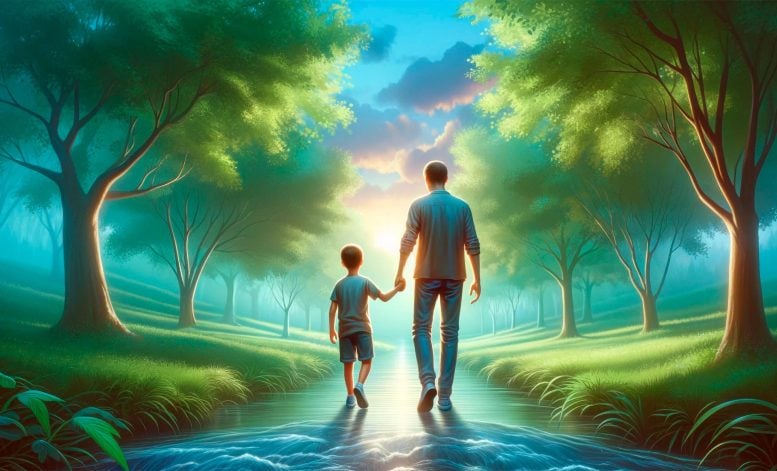
Relationships with caring adults provide a buffer against depression and anxiety, regardless of adverse childhood experiences.
A Columbia University study found that positive relationships with parents and other adults during childhood are associated with better mental health in adulthood, regardless of exposure to adverse childhood experiences.
The findings, published in JAMA Psychiatry on December 27, 2023, suggest that interventions promoting supportive adult connections during childhood could pay dividends in young adult population health, reducing the sociocultural risk of mental disorders, such as depression and anxiety.
“For kids, an extremely important resilience factor is a warm, nurturing relationship with a parent, caregiver, or other adult,” said lead study author Sara VanBronkhorst, MD, MPH, voluntary faculty in psychiatry at Columbia. “Our study demonstrates that children who have at least one positive, committed adult-child relationship are less likely to experience depression, anxiety, and perceived stress later in life.”
The study sought to address an important gap in research by focusing on marginalized and minoritized youth who are more likely to experience multiple adversities and gain insight into sociocultural factors that would bolster their resilience over a lifetime.
To identify markers of resilience, the investigators examined data from 2,000 participants in the Boricua Youth Study (BYS), a longitudinal study following three generations of families for 20 years, led by Cristiane Duarte, PhD, MPH, the Ruane Professor for the Implementation of Science for Child & Adolescent Mental Health at Columbia, who is also senior author of the JAMA Psychiatry paper. All participants in BYS are of Puerto Rican descent, about half originally residing in the island of Puerto Rico and others residing in the South Bronx, New York.
The researchers assessed for adverse childhood experiences, or ACEs, at three points during childhood. These experiences can include things like physical or emotional abuse, neglect, caregiver mental illness, death or incarceration, and household violence.
They also measured seven sociocultural factors associated with resilience, which included social relationships (maternal warmth and friendships) and sources of meaning (familism and family religiosity). Mental health outcomes were measured during young adulthood and included generalized anxiety disorder, major depressive disorder, substance use disorder, and perceived stress.
As hypothesized, they found that the measures of social relationships, apart from peer relationships, were associated with less depression and anxiety, and less perceived stress in young adulthood. Surprisingly, the researchers discovered that family religiosity, often thought to be protective, was associated with more—not less— perceived stress among young adults who had experienced high ACEs. Of note, while there were associations between resilience factors and later stress, depression, and anxiety, none of the resilience factors studied were associated with substance use disorder.
“With factors such as religiosity, the story may be more nuanced,” said Dr. VanBronkhorst. “One explanation for this unexpected finding could be that religious families may experience higher levels of shame and guilt related to ACEs, such as parental substance use or incarceration.”
The researchers said that the fact that several markers associated with resilience did not confer protection underscores the importance of preventing ACEs and highlights the need to find other ways of supporting children experiencing adversity in the context of marginalization and minoritization.
“We may need to look beyond traditional predictors of resilience,” Dr. Duarte said. “Future studies could look at the roles, for example, of financial resources, racism, and social equity on resilience.”
Dr. VanBronkhorst, who in addition to her role at Columbia works as a child and adolescent psychiatrist at Network180, a community mental health clinic, sees many children with high ACEs.
“The parents I work with see their kids struggling, they want to form these positive relationships, but so much gets in the way,” she said. “We should be helping them with parenting classes and family therapy; we can educate teachers and community members. But we should also be looking at larger, structural, interventions that could reduce the experiences of adversities and the causes of stress that interfere with adults forming bonds that can buffer children from stress.”
In this study we wanted to acknowledge that resilience cannot be reduced to individual attributes that one may be born with,” Dr. Duarte added. “Resilience is a process. To engage in this process, children and caregivers need access to resources in their environment that foster strong, responsive relationships and meaningful experiences.”
Reference: “Sociocultural Risk and Resilience in the Context of Adverse Childhood Experiences” by Sara B. VanBronkhorst, Eyal Abraham, Renald Dambreville, Maria A. Ramos-Olazagasti, Melanie Wall, David C. Saunders, Catherine Monk, Margarita Alegría, Glorisa J. Canino, Hector Bird and Cristiane S. Duarte, 27 December 2023, JAMA Psychiatry.
DOI: 10.1001/jamapsychiatry.2023.4900